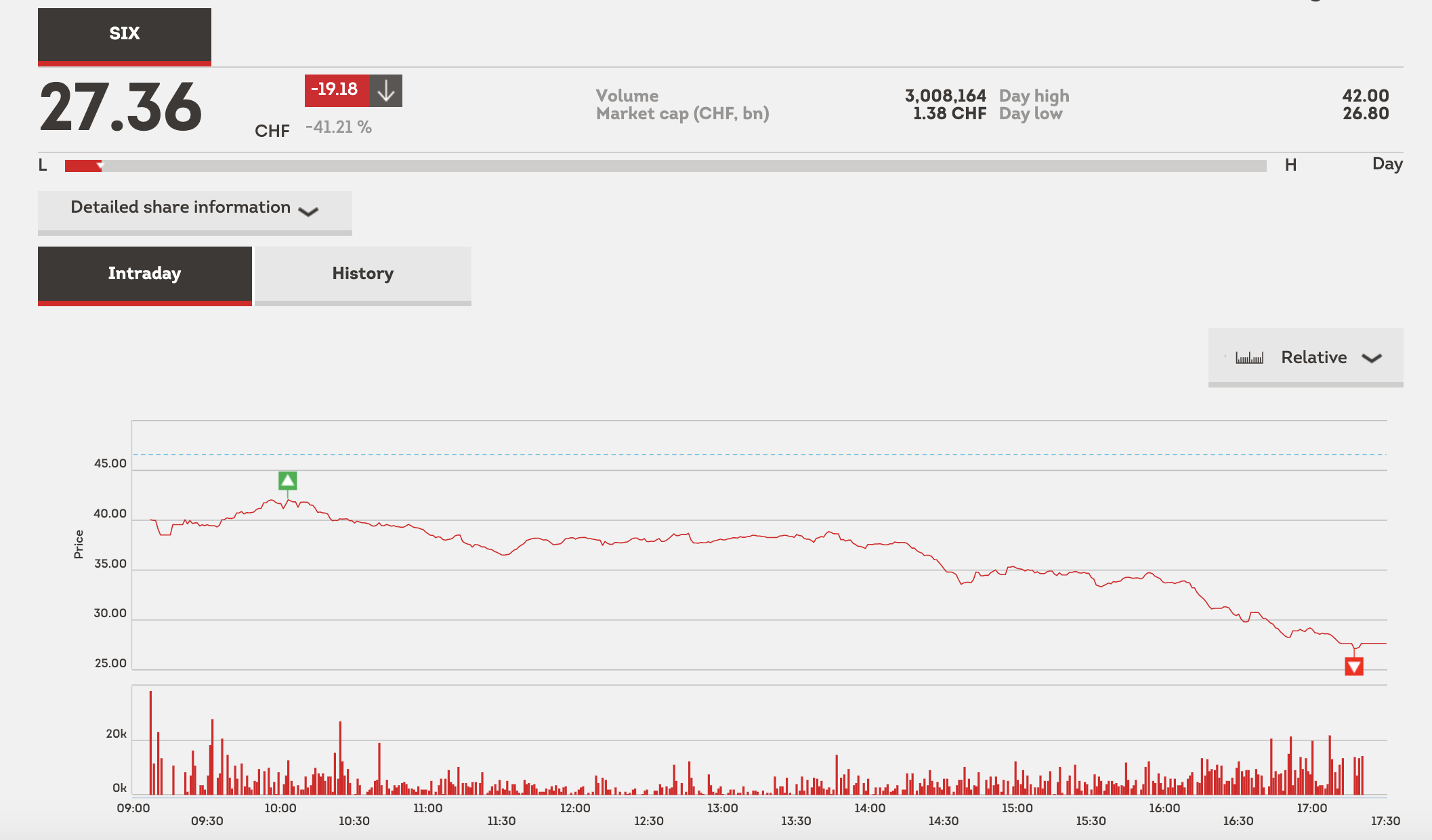SWITZERLAND. Dufry today put a brave face on the deepening COVID-19 crisis, pointing to the travel retail sector’s historic resilience during – and ability to bounce back quickly after – periods of turmoil. But CEO Julián Díaz’s words failed to stall a dramatic slump in the travel retail giant’s share price, which plunged -41.21% before closing at CHF27.36, a near -70% decrease since 12 February.

Speaking during the company’s earnings call today, Díaz said the company has introduced several initiatives to minimise the fallout from the crisis.
As reported, Dufry is expecting single-digit negative organic growth in 2020 provided the situation improves in the second semester. Using learnings from SARS, 9/11 and the global financial crisis of 2008, Díaz said during the company’s earnings call: “There is a period of time at the start of an economic crisis, which this is, where you have significant deterioration in the first three months. For the third and fourth month, you start to see a gradual improvement; this happens in the fourth and fifth month in the worst case scenario, as was the case in 2008.”
“Is this an example for today? I think so. As soon as the reason is mitigated, the situation will change dramatically.”

Díaz said it was essential for Dufry to act fast and protect the company’s P&L and cash generation in the face of the coronavirus. “As soon as we heard that something was starting to happen in the third week of January 2020, we created a specific group of top management in the company to analyse first of all what the situation was and to implement initiatives,” he said.
To protect the business, Díaz said the company’s priority is to protect liquidity, while looking to accelerate sales, maintain gross profit margin and address costs.
To accelerate sales, Dufry has introduced a global buy-two-get-one-free promotion. “If you visit any of our airports, you will see that we have a global promotion today,” Díaz continued. “Any product from the same supplier, you buy two and get one free. That is not expected to have a [negative] impact on the gross profit margin because we are working with the suppliers in the same direction: we want volume, they want volume.”

To maintain gross profit margin, Díaz said Dufry is negotiating its concession fees with the airports where footfall and sales have been worst affected by the health crisis. Most contracts are still operating on a variable formula rather than falling back to MAG (minimum annual guarantee) he insisted, noting that flexibility is needed from landlords.
Pressed by one analyst on the MAG versus variable balance, Díaz replied: “Most of the contracts are variable because they are based on percentage of sales – or if passengers drop then the rent automatically drops, especially with cruise lines and businesses like that,” he said. “Today we have 1,200 concessions and… I would say the most important part of those concessions will not be in MAG.
“If sales drop significantly, we will be in MAG, but this MAG will be adapted to the reality of the situation,” he said, in a reference to discussions with landlords.
“We all need to adapt the reality of the concession payments to the reality of the business. This is not something new – it happened in 2009, 2003 and before. The reality of the business will require three or four difficult months before the situation is normalised.”
The Dufry CEO claimed that Asia Pacific (including the Middle East) airports, in particular, had been receptive to discussions over contract relief. “We have received many calls from airports that want to collaborate and understand what the solutions are,” he added.
These discussions are most advanced in Asia, according to Díaz, because that region was the first to see sales impacted, but dialogue is also ongoing for other regions.
The retailer has also put on hold any seasonal hires across the business and is limiting temporary staff to minimise costs.
Geographic diversity key to resilience
Díaz also said that Dufry would be aided by its regional diversification strategy. “Depending on the region and division, we have had performance drop-off in one region and good performance elsewhere. Now we might have a good performance in South America and the US and a worse performance in other regions, but this diversification is important. We are a highly integrated company, meaning decisions can be implemented very quickly. If we need to do something tomorrow, it is implemented because we have control of the merchandise and our spaces globally.”
Asked about the path to recovery today, Díaz said candidly: “It is difficult to say where we are going now, but March is going to be a very difficult month, with double-digit negative growth for sure. We are thinking that April will be negative, but then in May and June there will be an increase.
“In the second half of the year, I hope for the recovery of traffic and the most important operations we have. Provided this situation happens, the company is in a position to protect cash generation and the P&L with the initiatives I already mentioned.”
Speaking about the travel ban introduced yesterday by the US for nationals from 26 European countries, Díaz was confident this would not substantially impact Dufry.
“In the US and Canada, around 70% of the business is duty paid local customers. The remaining 25% is duty free in Canada and 5% is duty free in the US. The most important US origin destination we have there is Heathrow and this is important because these flights are still happening,” he said [the UK is currently excluded from the ban -Ed].
Putting a difficult year ahead in context, Díaz said: “What we can learn about 2019 is important for understanding our situation in 2020. This company is very flexible and can generate cash. In circumstances where the company is not performing well, like in South America last year, the company can balance the business in different locations in a positive way.”
[More to follow tomorrow and in the forthcoming edition of The Moodie Davitt Magazine, Digital and Print editions].












